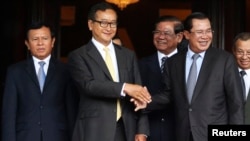Aside from a major Human Rights Watch report outlining human rights abuses under Prime Minister Hun Sen in the past decade, other observers say Cambodia suffered in other ways—and there is little hope it will change in the near term.
William Ford, program officer of Southeast Asia at Freedom House, said freedom of expression suffered as well.
“During the now 30-year reign of Hun Sen, he has time and again skillfully debilitated the political opposition, marginalized civil society and ignored the most basic demands of the Cambodian people, including for an accountable political system,” Ford wrote in an email.
“Future leaders of Cambodia who aim to promote democratic governance that protects human rights can learn a great deal about what not to do by studying the tenure of Asia’s longest-serving prime minister,” he said. “Hun Sen has maintained a patina of pluralism by portraying himself as a protector of Cambodia against the horrors of the past, but in actuality has retained power through brute force and patronage politics at the expense of Cambodians.”
Cambodia is ranked “not free” in terms of its press by Freedom House.
Hun Sen has faced a large amount of criticism from rights groups as he marks 30 years in power.
The Human Rights Watch report is particularly critical. In a speech Wednesday, Hun Sen, who has had a hand in leading the country in one way or other since 1985, admitted it had been difficult at times. But he said he did what he could when he came to power, at a time when war was breaking out, and had brought peace.
“Don’t be confused,” he said, referring to himself in the third person, as is his habit, “without Hun Sen’s hand, there would be no Paris Peace Accords. Be clear on this matter.”
Rights groups say that peace has come at the cost of civil liberties and basic human rights and freedoms.
Rupert Abbott, Amnesty International’s research director for Southeast Asia and the Pacific, told VOA Khmer by email that Cambodian authorities should indeed speed up the country’s reform process.
“Cambodia has signed up to many of the human rights treaties and conventions in international law, which means that it has an obligation to ensure that these rights are protected, from civil and political to economic, social and cultural rights,” he said. “Cambodia must put protection of human rights at the heart of its policies. Genuine political will and systematic reforms are required to bring about lasting improvements in the human rights situation. Many of the human rights problems in Cambodia are deeply entrenched, such as using the courts to silence activists, the lack of an independent judiciary, and impunity for human rights violations which sends a message that perpetrators will not be punished.”
Cambodia’s economic growth has been impressive, and the government deserves some credit for that, he said. But a land crisis, forced evictions and land grabs are creating “ongoing problems” the government has not addressed.
James Tyner, a professor of politics and geography at Kent State University, Ohio, said Cambodia, at this juncture, should be analyzed via a “totality of problems.”
“From issues of water security to food security, it is necessary to view the political, economic and social conditions of Cambodia’s people within a broader narrative of transnational governance,” he said. “In other words, the prime minister does not stand alone but is part of a more complex interplay of international actors that may or may not have Cambodia’s best interests at heart.”
However, much skepticism exists that Hun Sen, who remains securely in power, is likely to change.
“I don’t think he needs to,” Peter Maguire, a legal scholar and author, said. “He doesn’t rely much on the West, like he once did. He now has Chinese patronage to very much let him do whatever he wants, in terms of human rights. As long as they get their returns on their investments, they don’t care.”
Hun Sen has managed the West for years, he said, and China is a donor that does not get involved with Cambodia’s internal politics.
Meanwhile, Hun Sen’s son, Hun Manet, is being groomed as a potential successor. “True political change” will be needed if there is to be a democratic change of leadership, Maguire said, adding that demonstrations in 2013 showed that discontent still exists.
“I thought for a brief moment that change was in the air,” he said. “I mean, there are many Cambodians that are not content with the rule of Hun Sen.” As for electoral change, the question is whether that discontent will transfer to the polls, and whether Hun Sen would respect the results. “He certainly didn’t respect the results of the Untac election,” Maguire said.
Ny Chakrya, lead investigator for the rights group Adhoc, said he agrees with international rights groups that don’t expect much change under the current leadership.
But he urged future leaders to take examples from other countries that have sustained development, as well as rights and freedoms. “They should see how they rule their countries,” he said. In Cambodia’s environment, he said, it’s hard for leaders to change from authoritarianism, corruption and nepotism to human rights, democracy and justice.




